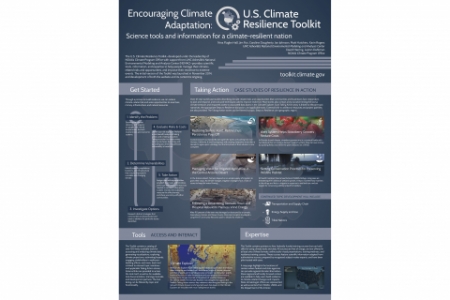In response to the President’s Climate Action Plan and Executive Order to help the nation prepare for the impacts of climate change, U.S. federal government agencies established two projects to help people build climate resilience. The Climate Data Initiative curates an online directory of climate-related data and metadata; the project’s goal is to spur innovation and entrepreneurship to advance preparedness. The Climate Resilience Toolkit provides descriptions and links to scientific tools, case studies, and expertise: this project’s goal is to help people manage their climate-related risks and opportunities and improve their resilience to extreme events.
The primary target audience of the Climate Resilience Toolkit is application-oriented professionals in state, local, and tribal governments, businesses and communities, and resource management sectors. Secondary audiences include executive managers, data analysts, GIS specialists, and the climate-interested public.
Using plain language and easy-to-use tools, the Toolkit illustrates climate-related vulnerabilities from national to local scales and summarizes specific steps to resilience. The site offers the following sections:
- Steps to Resilience—a five-step process to initiate, plan, and implement projects to become more resilient to climate-related hazards.
- Taking Action stories—real-world case studies describing climate-related risks and opportunities that communities and businesses face, steps taken to plan and respond, and tools and techniques used to improve resilience.
- A catalog of freely available Tools for accessing and analyzing climate data, generating visualizations, exploring climate projections, estimating hazards, and engaging stakeholders in resilience-building efforts.
- Climate Explorer—a visualization tool that offers maps of climate stressors and impacts as well as interactive graphs showing daily observations and long-term averages from thousands of weather stations.
- Topic narratives that explain how climate variability and change can impact particular regions of the country and sectors of society.
- Pointers to free, federally developed training courses that can build skills for using climate tools and data.
- Maps highlighting the locations of centers where federal and state agencies can provide regional climate information.
- The ability to Search the entire federal government’s climate science domain and filter results according to specific interests.
The Climate Resilience Toolkit was developed under the leadership of NOAA’s Climate Program Office, with support from UNC Asheville’s National Environmental Modeling and Analysis Center (NEMAC).


